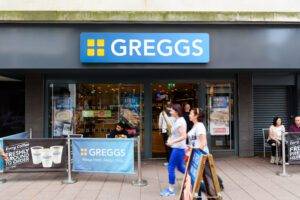Greggs Faces Profit Margin Pressure Amid Rising Wage Costs

![Heathrow has said passenger numbers were 60% lower in November than before the coronavirus pandemic and there were “high cancellations” among business travellers concerned about being trapped overseas for Christmas as Omicron spreads. The UK’s largest airport said the government’s travel restrictions had dealt a fresh blow to travel confidence and predicted it was likely to take several years for passenger numbers to return to pre-pandemic levels. This week ministers said passengers arriving in the UK would have to take a pre-departure Covid test, as well as a post-flight test, because of fears about the spread of the new variant. “[The] high level of cancellations by business travellers concerned about being trapped overseas because of pre-departure testing shows the potential harm to the economy of travel restrictions,” the airport said in an update. Heathrow said the drop in traveller confidence owing to the new travel restrictions had negated the benefit of reopening the all-important corridor to North America for business and holiday travel last month. Eleven African countries have been added to the government’s red list, requiring travellers to quarantine before reuniting with families. “By allowing Brits to isolate at home, ministers can make sure they are reunited with their loved ones this Christmas,” said John Holland-Kaye, the chief executive of Heathrow. “It would send a strong signal that restrictions on travel will be removed as soon as safely possible to give passengers the confidence to book for 2022, opening up thousands of new jobs for local people at Heathrow. Let’s reunite families for Christmas.” Heathrow said that if the government could safely signal that restrictions would be lifted soon, then employers at Heathrow would have the confidence to hire thousands of staff in anticipation of a boost in business next summer. The airport is expecting a slow start to 2022, finishing next year with about 45 million passengers – just over half of pre-pandemic levels. This week Tui, Europe’s largest package holiday operator, said it expected bookings for next summer to bounce back to 2019 levels. However, Heathrow said on Friday not to expect the aviation industry to recover for several years. “We do not expect that international travel will recover to 2019 levels until at least all travel restrictions (including testing) are removed from all the markets that we serve, at both ends of the route, and there is no risk of new restrictions, such as quarantine, being imposed,” the airport said.](https://wheretogetfinance.com/wp-content/uploads/2024/05/shutterstock_1100012546-300x200-1.jpg)
Greggs, the popular high street bakery chain, is grappling with rising wage costs, which are impacting its profit margins despite a notable increase in first-quarter sales.
Roisin Currie, Chief Executive of Britain’s largest bakery chain, highlighted that the “majority of cost inflation pressures that we face this year is wages,” underscoring that labour costs remain the biggest financial burden for the company. Greggs anticipates its overall inflation for the year to be between 4% and 5%, primarily driven by wage increases, which offset easing pressures in other parts of the supply chain.
Currie, 52, stated that Greggs would continue to monitor and review price increases regularly. While the company does not have a fixed plan for pricing, she emphasized the need to remain flexible and responsive to ongoing economic conditions, reviewing their stance on a week-to-week and month-to-month basis.
Founded in 1939 by John Gregg as a small bakery on Tyneside, Greggs recently celebrated the milestone of operating 2,500 shops nationwide. The company plans to expand further, with between 140 and 160 new shop openings expected this year. The expansion includes more outlets in supermarkets, petrol stations, and travel locations, as well as a broadened delivery service through a partnership with Uber Eats, following a successful trial with Just Eat.
Despite the economic challenges, Greggs has managed to attract cash-strapped customers with its affordable products, outperforming many in the hospitality sector. The company even claimed to have overtaken McDonald’s as Britain’s most popular breakfast spot this year.
This momentum has continued into the new financial year, with Greggs reporting a 7.4% rise in like-for-like sales for the first 19 weeks, driven by its aggressive store expansion strategy. Total sales reached £693 million.
Greggs maintained its full-year forecasts, with analysts predicting a rise in pre-tax profit to £185 million, up from £168 million last year. Analysts at Peel Hunt noted that while the past couple of months have been slightly slow in like-for-like sales, this would not affect overall forecasts.
Greggs continues to navigate the challenges posed by rising wages while leveraging its expansion plans and affordable pricing to maintain its market position and drive growth.
Read more:
Greggs Faces Profit Margin Pressure Amid Rising Wage Costs
